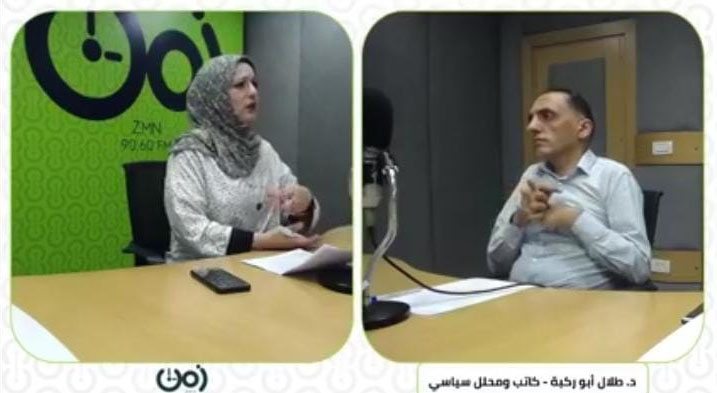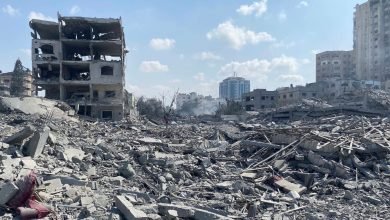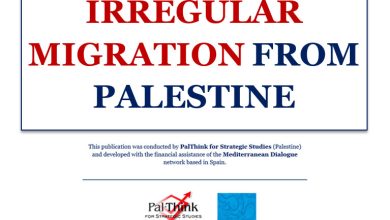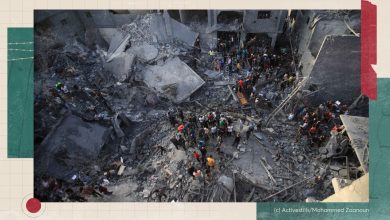Why are elections a priority for Palestinian society?

Pal-Think for Strategic Studies carried out a broadcast on Zaman Radio entitled “Why are elections a priority for Palestinian society?” This is during the “Electoral Issues” programme of the “Empowering Civil Society Role to Achieve Palestinian Elections” project, funded by the Government of Canada. The project aims to strengthen the role of civil society and to activate the role and political and community participation of young people in support of Palestinian elections.
Dr Talal Abu Rokba, who is a writer and political analyst, was the broadcast’s guest. He began by thanking Pal-Think for its efforts to disseminate the political knowledge and culture of Palestinian society, especially among young people.
Then he noted that Palestinian society had not matured in its natural setting because of uprooting and displacement. The political analyst added that what the Palestinians came up with after their revolution was a “consensual democracy,” a consensual, factional way to represent the Palestinian people.
The end of the transition in 2000 had ended the democratic process once again, as confusion and engagement with the Israeli occupation, which had prevented and neglected any democratic process, had returned. This situation continued until the Palestinian needed to elect a new president in time, so the second presidential election was held in 2005.
The second legislative election in 2006 was then reversed by the international rejection of the results of the elections, the imposition of sanctions and the subsequent Palestinian internal conflict. The electoral process was then fully scheduled for 14 years in the West Bank and Gaza Strip.
Abu Rokba stressed the need to hold elections, especially after the failure of reconciliation dialogues between the Hamas and Fatah parties over the past years. He said that they were in front of a system of relative representation of” lists, “through which all experts assert that no faction can obtain 50 + 1, and that we needed a broad coalition within the Legislative Council to form a government of the Palestinian Authority, which would bring together all to form a government of national unity like the nations of the world.
Abu Rokba described the Palestinian elections as an “instrument of the Palestinian struggle” and gave the indication that Palestinian society had the right to determine its own destiny, to believe in democracy and to uphold the Palestinian right.
The researcher explained that, following the recent Israeli escalation, one of the most striking differences was that a state of societal frustration prevailed after the cancellation of the elections and a loss of confidence within society even among brothers. He further noted that some Palestinians lost their hope of establishing the state of Palestine, however after the recent aggression once again gave consideration to the Palestinian question, calling it “the battle to restore consciousness towards Palestine and all of Palestine.
Abu Rokba pointed out that for the first time, the Palestinian and Israeli people are equal in their right to equality and to live in dignity. This is what we have observed in the words of the heads of state. This is because of the success of the Palestinian citizen’s press, which is just a beginning to be built on.
He also stated that the Palestinian elections will be on the international table in the coming period and that the Israeli rejection and intransigence that existed before the last aggression will be changed by the shift in international public opinion.
He further noted that they have seen some reports in international newspapers calling for an end to attacks on Palestinians, which means that there are dramatic shifts in the international mainstream consciousness when it comes to Palestine, and Palestinian society. Then he pointed out that they need to invest in this politically. And to start with the internal political situation.
Then he further noted that the opportunity for a national consensus government is setting the stage for full proportional representation so that all Palestinian parties can represent themselves and can restore the political factions.
He also added that in the light of the dramatic reversal of the Palestinian cause, the elections were a way to reshape Palestinian society and the official institution.
Mr Talal concluded by saying that he wants to emphasize the role of the Palestinian diaspora in conveying the Palestinian situation to the world during recent events, which confirms the unity of Palestinians’ fate.
“The designations employed and the representation of material in this program do not imply the expression of any opinion whatsoever on the part of the Government of Canada.”




